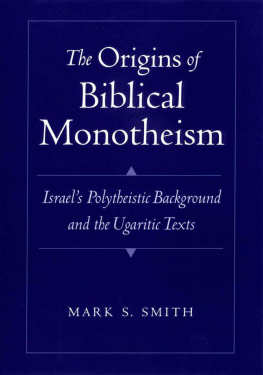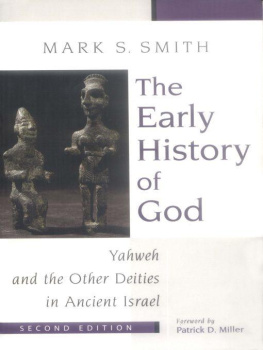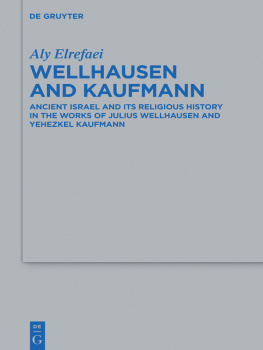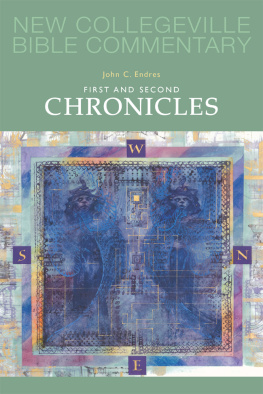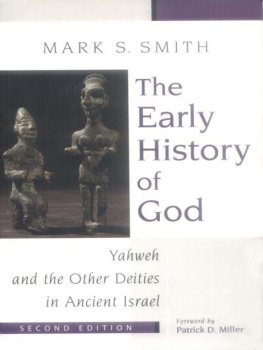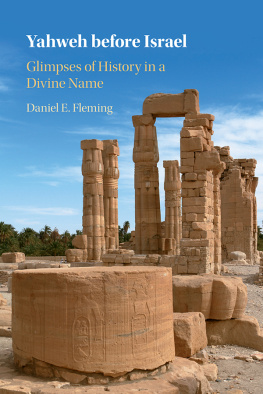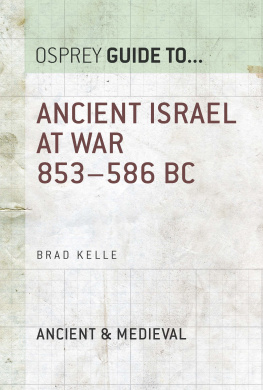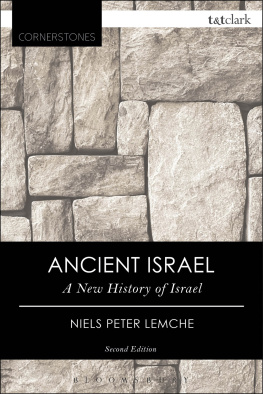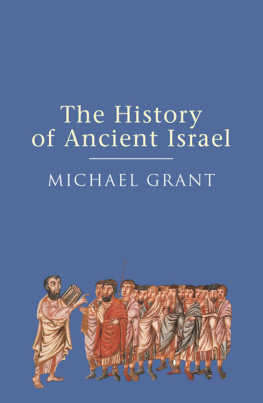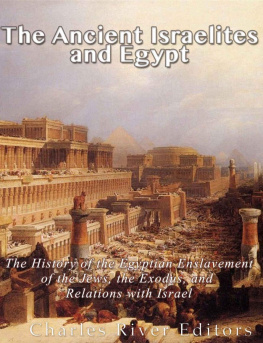Mark S. Smith - Memoirs of God
Here you can read online Mark S. Smith - Memoirs of God full text of the book (entire story) in english for free. Download pdf and epub, get meaning, cover and reviews about this ebook. year: 2004, publisher: Augsburg Fortress Publishers, genre: Religion. Description of the work, (preface) as well as reviews are available. Best literature library LitArk.com created for fans of good reading and offers a wide selection of genres:
Romance novel
Science fiction
Adventure
Detective
Science
History
Home and family
Prose
Art
Politics
Computer
Non-fiction
Religion
Business
Children
Humor
Choose a favorite category and find really read worthwhile books. Enjoy immersion in the world of imagination, feel the emotions of the characters or learn something new for yourself, make an fascinating discovery.
- Book:Memoirs of God
- Author:
- Publisher:Augsburg Fortress Publishers
- Genre:
- Year:2004
- Rating:4 / 5
- Favourites:Add to favourites
- Your mark:
- 80
- 1
- 2
- 3
- 4
- 5
Memoirs of God: summary, description and annotation
We offer to read an annotation, description, summary or preface (depends on what the author of the book "Memoirs of God" wrote himself). If you haven't found the necessary information about the book — write in the comments, we will try to find it.
Memoirs of God — read online for free the complete book (whole text) full work
Below is the text of the book, divided by pages. System saving the place of the last page read, allows you to conveniently read the book "Memoirs of God" online for free, without having to search again every time where you left off. Put a bookmark, and you can go to the page where you finished reading at any time.
Font size:
Interval:
Bookmark:







"Remarkable for his range of interests, erudition, and mastery of detail, Mark Smith here makes available to non-specialists new thinking on two key issues in biblical interpretation: collective memory and monotheism. Smith skillfully shows how profoundly these issues affect the meaning of divinity in the Bible, the concept of history, and the formation of Israel's concept of God. On the way, the reader is constantly brought up to date on a wide variety of biblical topics. Highly recommended."
- RICHARD CLIFFORD
Weston Jesuit School of Theology
"Mark Smith's view of the evolution of monotheism in Israel is highly persuasive, and should command a consensus. In this book he enriches the discussion by explaining the process of selective memory that shaped the biblical account. An important contribution to the study of the religion of Israel."
- JOHN J. COLLINS
Yale Divinity School
"In this extremely well-written book, Mark Smith brings his groundbreaking work on the religion of ancient Israel to the general public. Going beyond his earlier work, this book also applies the revolutionary work of historians on collective memory to understanding the history and religion of ancient Israel. Readable, yet scholarly, this delightful book deserves to be read by both Christians and Jews, scholars and students, or anyone interested in understanding the Bible."
-WILLIAM M. SCHNIEDEWIND
University of California, Los Angeles
of the Divine in Ancient Israel
MARK S. SMITH
In great gratitude and appreciation to my graduate and undergraduate students and to my departmental colleagues at New York University, Daniel Fleming most of all
viii
Xi
xii
xix
i
... and all my memories are closed courtyards at summer's high noon.
-Yehudah Amichai, "Jerusalem Is a Cradle"
As I remember it, this book started in the fall of 2000, my first semester at New York University. I was looking through a bookshop off Washington Square, and I came across Religion as a Chain of Memory published by Daniele HervieuLeger in 2000. I stopped; I was transfixed by what I read and I thought to myself-this is what the Bible is, a collection of Israel's memories about its past, in T. S. Eliot's words, "mixing memory and desire." Or, in the terms used by the tradition of the Annales school standing behind Hervieu-Leger's work, the Bible is Israel's record of its collective memory. What I am presenting in this book is a synthesis of insights and research that began with Religion as a Chain of Memory and led me back to works by biblical scholars that helped me to think about history and memory about Israel and its Deity. Many studies informed my discussion of the issues, and I happily recall my debt to the scholars listed in the bibliography. Chief among them are Rainer Albertz, Elizabeth Bloch-Smith, Avraham Faust, Baruch Halpern, Friedhelm Hartenstein, Ronald S. Hendel, Baruch Levine, Bernard Levinson, Nadav Na'aman, David Schloen, Karel van der Toorn, and Franz Wiggermann.
In many respects, this book is the result of my years of teaching at New York University. In various graduate and undergraduate courses, I have benefited from discussions devoted to the issues presented in this work. For this reason, I am very grateful to my students at NYU. The first two chapters have been improved by constructive readings of four of my departmental colleagues at New York University: Robert Chazan, Hasia Diner, David Engel, and Lawrence Schiffman. My NYU colleague Daniel Fleming has been an inspiration to me in many ways; not least has been his collegial attitude and aid. He read an earlier draft of this work, and as usual, he added many good comments and criticisms to which I have tried to respond in rewriting this book. My investigations into collective memory, marked especially in chapter 4, began with my inaugural lecture as professor at New York University. I also gave a form of this talk at the national meeting of the Catholic Biblical Association of America in 2001 (subsequently published in Catholic Biblical Quarterly in 2002). A number of colleagues at the meeting offered helpful suggestions. In particular, I am grateful for the bibliographic aid that Gregory Sterling provided to me in the area of New Testament studies pertaining to memory. I am further indebted to the Catholic Biblical Association for its strong support over the past two decades.
Contacts with colleagues elsewhere have also contributed to this work. Chapter 3 is based on lectures given 8-12 November 2003 at the universities of Hamburg, Marburg, and Gottingen. I especially wish to thank Dr. Klaus-Peter Adam (at Marburg) as well as Professors Friedhelm Hartenstein (at Hamburg) and Hermann Spieckermann (at Gottingen) for arranging these talks. I am further indebted to Dr. Adam for arranging my visit to the University of Giessen on 12 November 2003. There, in the academic home of Hermann Gunkel, I gave a lecture on collective memory in ancient Israel, which is included here as chapter 4. The Sonderforschungsbereich Erinnerungskulturen at Giessen provided the basic funding for the entire trip, and I am grateful in particular to its director, Dr. Almuth Hammer, for her interest in my work on collective memory. As one of the largest research institutes in Germany today, the Sonderforschungsbereich Erinnerungskulturen at Giessen has assumed the massive task of studying collective memory across a score of academic disciplines, and it promises to illuminate the ways in which the academy understands itself as implicated in the transmission of our cultures' past. All four of the lectures and the ensuing discussions provided me with wonderful opportunities to air the questions and information addressed in this book. Particularly helpful, as well as delightful, were my visits with Professors Klaus Koch and Friedhelm Hartenstein in Hamburg; with Professors Hermann Spieckermann, Reinhard Kratz, and Rudolf Smend at Gottingen; with Professors Erhard Gerstenberger and Jorg Jeremias at Marburg; and with Professor Jeremias and the Sonderforschungsbereich Erinnerungskulturen at Giessen. I also enjoyed my many conversations with Dr. Adam, who served generously as my guide throughout this trip to Germany.
In the fall of 2003, I also had the opportunity to discuss a number of issues with Jan Assmann, Marc Van De Mieroop, and David Carr following a lecture delivered by Professor Assmann at Union Theological Seminary. In chapter 3 readers will recognize the vast differences between the views of Professor Assmann and myself. Despite our differences in outlook on biblical monotheism, I found our conversation enormously engaging and helpful. Karel van der Toorn and I spent hours in discussion during his visit to the United States in November of 2003. After his return to the Netherlands that fall, he read a draft of this work and offered several helpful remarks, for which I am grateful.
Font size:
Interval:
Bookmark:
Similar books «Memoirs of God»
Look at similar books to Memoirs of God. We have selected literature similar in name and meaning in the hope of providing readers with more options to find new, interesting, not yet read works.
Discussion, reviews of the book Memoirs of God and just readers' own opinions. Leave your comments, write what you think about the work, its meaning or the main characters. Specify what exactly you liked and what you didn't like, and why you think so.


